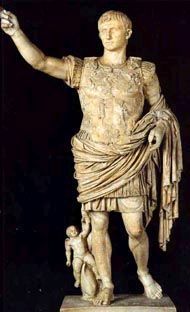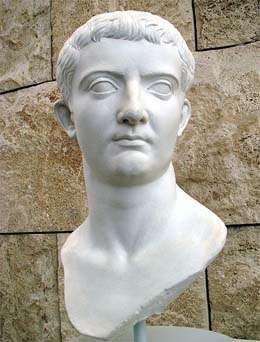After the victory of Octavian Augustus over Mark Antony in the battle of Actium (31 year BCE) and his death in 30 BCE, the civil war was actually over. The fate of the entire Roman state was in the hands of the adopted son Julius Caesar.
The young leader did not intend to resign from the power that the army gave him to the republic. With enormous military strength under his sole command, he was the actual lord of the Roman empire, and it was up to his will what form he wanted to give to his governments. The only rival who could oppose him at that time was the Senate. However, he was clearly at odds, did not have any exit program, did not have an army under his command and, most importantly, there were many Octavian supporters in the curia.
Immediately after arriving in Rome in 28 BCE, Octavian strengthened his position by accepting the honorary title of the first senator (princeps senatus) and the first citizen (princeps civium) – from that the name of this form of government came: the principate. From that moment it also began to be called princeps, meaning emperor.
Appreciating the republican attitude of most Roman society, Octavian tried to mask his power, avoiding the slightest appearance that he was a monarch. To this end, he acted extremely cautiously and influenced public opinion through his numerous friends. On January 13, 27 BCE, he solemnly resigned from all his powers in favour of the Senate, which in theory was meant to restore the republic. After all, he received the position of proconsul (imperium proconsulare), which he later extended several times. This position gave him command over all the armies in Gaul, Spain and Syria, which, in conjunction with Egypt, which was his private domain, made him completely independent of the senate (he was given control of provinces not manned by soldiers).
The year 27 BCE is considered the official fall of the republic and the beginning of the empire.
Senate, fearing the strength and influence of Octavian, began to shower him with various titles and positions. He was given the title of August, or a husband of providence, and was elevated above all officials (auctoritas). To emphasize the uniqueness of his rule, Octavian took over the consulate, which, with its proconsular power, implemented the principle of cumulation of offices, which gave it a supreme position in the state. Gradually, however, he began to gain more and more rights. In 23 BCE he gave up his permanent election to consul and expanded his consular authority with imperium maius, which gave him the right to inspect the Senate provinces and publish their ordinances therein, the so-called edicts. Octavian’s previous rights concerned mainly foreign policy and state administration, when internal affairs remained beyond his reach. To this end, he received a new empire, the tribune authority (tribunicia potestas), which gave him the right to convene the senate and people’s assemblies, the priority of proposing or vetoing the resolutions of the senate or assembly. Both these authorities, i.e. proconsular and tribune, were the main powers of all later emperors.
In 19 BCE, Octavian received lifelong consular power (imperium consulare) and, for 5 years, oversight of customs (cura morum). Octavian, desiring to expand his authority also to the religious sphere, received in 12 BCE the position of the high priest (pontifex maximus), which gave him protection over the entire religious life of the Romans. In 2 BCE he was awarded the title of father of the homeland (pater patriae). It is also worth mentioning the right to present candidates for the highest offices (ius commendationis), supply Rome and Italy with grain (cura annonae) and road supervision (cura viarum ). The princeps did not perform all these functions alone, but he delegated special officials appointed by him, who had the title of prefect, to perform them. Princeps were to be advised by people with the title of his friends (amici Caesaris). The emperor also had the exclusive command of the army; he had the title of emperor, which the victorious army bestowed upon his commander, and had the right to triumph. To protect the emperor, he was assigned a bodyguard, the so-called Praetorian Guard.
The principate was fully formed, in which the emperor concentrated full power, with the appearance of maintaining republican institutions.
The Senate, despite losing all previous rights, still had some prerogatives. For example, he had the right, under a special law, lex de impero to grant the future emperor rights, and after his death to approve or reject his laws. In addition, the Senate, in a situation where the People’s Assembly lost its meaning completely, took over its position and concentrated in its hands legislative rights that were not under the control of the princeps. The senate remained the board of the old, romanized provinces (of which it was discussed) and the treasury (aerarium populi romani).
Certainly, the biggest mistake of the new form of the system was the right not to inherit power from father to son, contained in the aforementioned lex de impero. This was a clear oversight, officially placing a place in power after the death of the emperor not filled. This distinctive feature of the new rule was the cause of violent internal upheavals: usurpation and civil wars that torn Rome for centuries until the formation of dominate. However, it cannot be denied that changing the system of power, from a republic that was not able to function properly when expanding its borders and developing the state, became a just and necessary reform.







